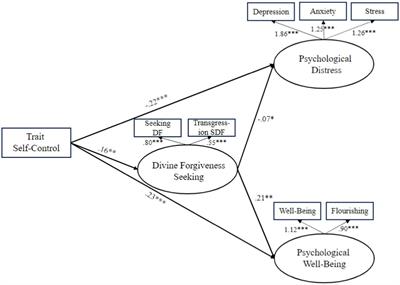Psychological perspectives on divine forgiveness: 3. Trait self-control is associated with well-being through seeking divine forgiveness

Introduction: Although a majority of the world’s population believes in a Higher Power and subscribes to a religion in which divine forgiveness is emphasized, little work has been done to understand individual differences associated with seeking divine forgiveness. Methods: Building on work that suggests trait self-control facilitates well-being, the current study (N = 439, undergraduate students) applies structural equation modeling (SEM) to test whether believers higher (vs. lower) in trait self-control are more likely to seek divine forgiveness, and, in turn, have better psychological health. Results and discussion: We find that people higher in self-control engage in more divine forgiveness seeking (b = 0.16), and seeking divine forgiveness represents one of the pathways associated with psychological health (i.e., seeking is associated with higher well-being, b = 0.21, and lower distress, b = −0.07). Crucially, we operationalize both positive (well-being and flourishing) and negative (depression, anxiety, stress) aspects of psychological health and control for religiosity.
These results suggest that for those who believe in God, seeking divine forgiveness may be one mechanism that links individuals’ self-control to good psychological health, and this is not merely an artifact of higher levels of religiosity. Limitations and future directions are discussed.
Read the full article at the original website
References:
